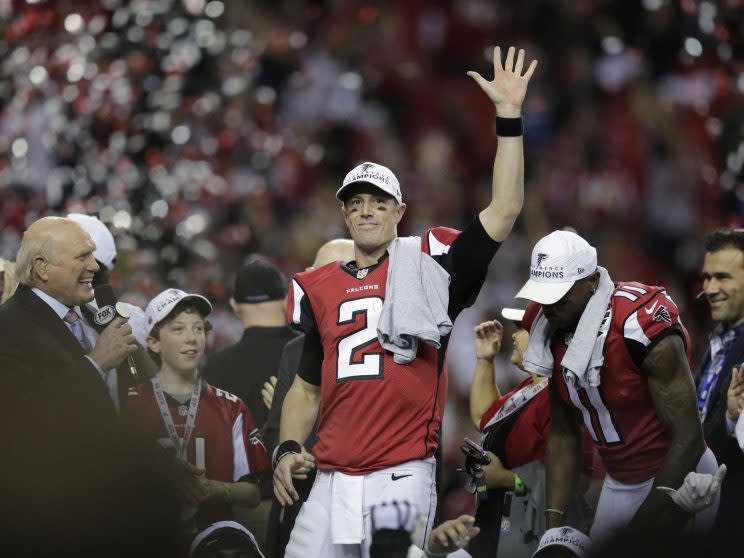Why the NFL makes companies call the Super Bowl the 'Big Game'

It seems like you no matter where you turn your head this week you’re inundated with ads talking up some large athletic event that will take place this Sunday known only as “The Big Game.”
The accompanying graphics indicate football will be played, but it can’t be the Super Bowl. Otherwise, advertisers would just call it that, right?
Wrong! The National Football League’s championship is unique not only in its enormous television audience (almost 112 million last year) and advertising costs (about $5 million for a 30-second spot), but in the NFL’s quest to control the name “Super Bowl,” as well.
Dare not speak its name
You can see this in any ad linking an unrelated company to the game, whether it’s Best Buy (BBY) exhorting you to “Bring Your A-Game To The Big Game” or Chipotle (CMG) suggesting that having the burrito chain cater your Super… I mean, Big Game party is “Always A Good Call.”
This shyness also surfaces in press releases, whose longer form lets you see other obvious vocabulary vanish.

Consider, for instance, an AT&T (T) press release touting its network around Super Bowl LI host city Houston (it uses “Big Game” in quotes, as if it is a novel phrase) and a Sprint (S) release making similar claims about its Bayou City bandwidth. Neither include the abbreviation “NFL” or the teams in the Super Bowl, the Atlanta Falcons and the New England Patriots.
Yet if you click over to the next release on Sprint’s PR page, you’ll see a headline touting its Super Bowl ad as, yup, a “Super Bowl LI Commercial.” Remember, Super Bowl advertisers pay for their publicity.
Licensing versus litigation
For about the 258 millionth time in pro sports, it’s about money — what the NFL can make by licensing its trademarks, and what it can lose by letting other businesses use them for free.
“They have one of the most powerful brands, and one of the most valuable brands in existence,” said Kevin Goldberg, a lawyer with Fletcher Heald & Hildreth in Arlington, Va., which specializes in intellectual property. Putting that two-word phrase in an ad — or, perhaps, a headline — can get people’s attention.
The NFL can’t stop journalists from calling the Super Bowl what it is (although it does impose rules on reporters and photographers with game passes). Commercial use doesn’t get the same latitude under trademark law.
“There are a lot of companies that pay an exorbitant amount of money to have an association with the Super Bowl,” said Antigone Peyton, CEO of the Mclean, Va., intellectual-property-focused firm Cloudigy Law. Companies that try to leverage this brand without paying can expect a nastygram, if not an actual lawsuit.
We reached out to the NFL asking for comment, but did not receive a response.
This is distinct from everyday trademark defense, in which companies try to stop people from using brand names for other products. Letting that happen invites a court to rule that the trademark has become generic, leaving its value in a dumpster.
But nobody uses “Super Bowl” for college football’s championship or the Canadian Football League’s Grey Cup.

Outside the lines
Goldberg and Peyton said other sports leagues — as well as the International Olympic Committee — can be equally protective of team and championship names. But the NFL also tries to quash commercial uses of words and phrases that only overlap its trademarks.
Compared to other U.S. pro sports leagues, Peyton called the NFL “the most aggressive” and Goldberg said it was “clearly the most active” about policing its intellectual property.
Most notoriously, the NFL tried to trademark “Big Game” but gave up in 2007 after Stanford University and the University of California at Berkeley objected. Both use that name for the yearly contest that predates the NFL’s founding by 28 years.
That same year, the NFL opposed a “Superb Owl” trademark registration for a 5K run in Phoenix — though that didn’t stop Stephen Colbert from running with “Superb Owl” in a 2014 show mocking pro football’s moniker micromanagement.

In 2010, the NFL tried to claim ownership of the New Orleans Saints catchphrase “Who Dat?” but retreated after receiving complaints from Louisiana residents. (Peyton represented a retailer, Fleurty Girl, that sold shirts with that phrase.)
In 2013, the NFL leaned on a fan who had thought to register “Harbowl” months before San Francisco 49ers coach Jim Harbaugh and Baltimore Ravens coach John Harbaugh met in the Super Bowl. The fan surrendered the trademark.
You can look at all of this and retreat into bitterness, decrying this trademark tyranny as yet another example of the No Fun League’s obsessive image consciousness. See also: last year’s adoption of a social-media policy so control-freakish that NFL franchises trolled it on Twitter before the league backpedaled seven weeks later.
But let’s try to think positively. Here we have a chance for Patriots and Falcons fans to find one thing to agree on in this deeply divided time — they have one more reason to dislike NFL commissioner Roger Goodell.
More from Rob:
Malware study shows people still falling for old tricks, but there’s hope
Study finds most people are scarred of being hacked, but don’t do much about it
Email Rob at [email protected]; follow him on Twitter at @robpegoraro.
